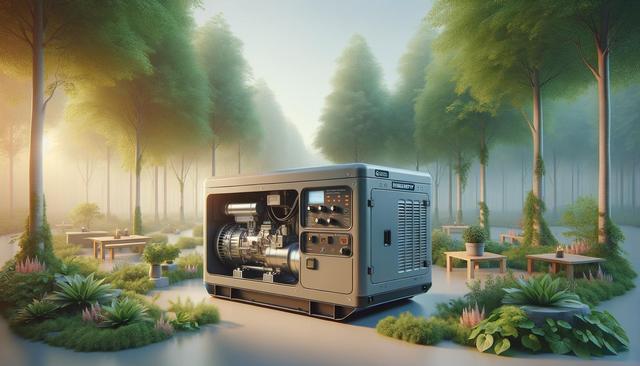Why an Emergency Generator Is a Smart Investment for Any Home
Power outages can be unpredictable, but an emergency generator provides peace of mind when the lights go out.

Understanding the Role of an Emergency Generator
An emergency generator serves as a backup power source that activates automatically or manually when your primary electricity supply fails. Whether caused by storms, grid malfunctions, or maintenance issues, power outages can disrupt daily life and even pose safety risks. An emergency generator helps maintain essential systems, such as heating, refrigeration, and medical devices, during these critical times. Generators come in various types and capacities, making it possible to tailor them to residential, commercial, or industrial needs.
There are generally two main types of emergency generators: portable and standby. Portable generators are smaller, more affordable, and suitable for temporary use. They require manual setup and refueling but are useful for short-term outages. Standby generators, on the other hand, are permanently installed and automatically start when power loss is detected. These are particularly beneficial for homes or businesses that cannot afford prolonged downtime.
Having a generator on hand means you can continue to use key appliances and systems without interruption. This can help preserve perishable food, maintain indoor temperatures, and keep communication devices charged. It’s a proactive measure that ensures comfort and safety during unexpected events.
Choosing the Right Type of Generator
Selecting an emergency generator involves evaluating your specific power needs. A small household may only require a few thousand watts to power essentials like a refrigerator, lights, and a sump pump. In contrast, a large home or business might need a generator capable of supporting central heating systems, multiple appliances, and security features.
When choosing a generator, consider the following factors:
- Fuel type: Generators can run on gasoline, diesel, propane, or natural gas. Each has advantages regarding availability, cost, and storage.
- Power output: Measured in watts, this determines how many devices your generator can support at once.
- Run time: This indicates how long the generator will operate on a full tank or fuel source.
- Noise level: Some models are designed for quieter operation, which is important in residential areas.
It’s also wise to consult a licensed electrician or generator specialist who can assess your home’s wiring and recommend a model that aligns with your requirements. This ensures safe installation and operation, particularly with standby systems that connect directly to your electrical panel.
Installation and Safety Considerations
Proper installation of an emergency generator is essential for safety and efficiency. Portable units should always be placed outdoors and away from windows, doors, and vents to avoid carbon monoxide buildup. Using a transfer switch is recommended when connecting a portable generator to your home, as it prevents power from backfeeding into the grid and endangering utility workers.
Standby generators must be installed by professionals to ensure compliance with local codes and regulations. These systems often involve:
- A concrete pad or stable surface for placement
- Connection to a home’s fuel supply, such as natural gas or propane
- Integration with the main electrical system via an automatic transfer switch
Routine maintenance is also crucial. This includes checking oil levels, replacing filters, and inspecting battery connections. Many manufacturers recommend annual servicing to ensure the generator remains in working condition when needed most.
Investing in a carbon monoxide detector is another safety measure that can alert you to dangerous gas levels. Always read the user manual and follow operational guidelines closely to avoid accidents or equipment damage.
Common Use Cases and Benefits
Emergency generators are valuable in a variety of scenarios. Homeowners often rely on them during severe weather events like hurricanes, ice storms, or high winds that can knock out power for hours or even days. In rural or remote areas where power restoration can take longer, a backup generator becomes even more essential.
Key benefits include:
- Continuity of daily life: Keep essential appliances, lighting, and communication tools running.
- Protection of property: Avoid water damage by keeping sump pumps and dehumidifiers operational.
- Health and safety: Power medical equipment, maintain heating or air conditioning, and preserve food.
- Increased home value: Some buyers view standby generators as a desirable feature.
Beyond residences, many businesses depend on generators to prevent lost revenue, data loss, and customer dissatisfaction. Hospitals, grocery stores, and data centers often use backup power to ensure uninterrupted service and safety.
Maintenance Tips for Long-Term Reliability
For an emergency generator to function reliably during an outage, it must be well-maintained. Neglected equipment can fail when it’s needed most, defeating the purpose of having a backup power source. Fortunately, maintenance tasks are straightforward and often outlined in the user manual.
Some practical maintenance steps include:
- Running the generator periodically to ensure it’s operational
- Checking and changing oil and filters at recommended intervals
- Inspecting spark plugs, fuel lines, and electrical connections
- Storing fuel properly and using stabilizers to prevent degradation
Standby generators may also feature self-testing modes that operate the system briefly each week. Monitoring these tests and any alerts or error codes can help identify issues before they become serious. It’s also a good idea to keep a log of all maintenance activities for reference.
Scheduling professional inspections annually can catch wear and tear that may not be visible to the untrained eye. This proactive approach ensures that your generator will provide dependable service during emergencies.
Conclusion: Be Prepared When the Unexpected Happens
Having an emergency generator is more than just a convenience—it’s a strategic investment in your home’s safety and resilience. Whether you’re preparing for seasonal storms, living in an area prone to blackouts, or simply want peace of mind, a well-chosen generator can make a significant difference. By understanding your power needs, choosing the right system, and maintaining it properly, you’ll be ready to keep your household running smoothly even when the grid goes down.